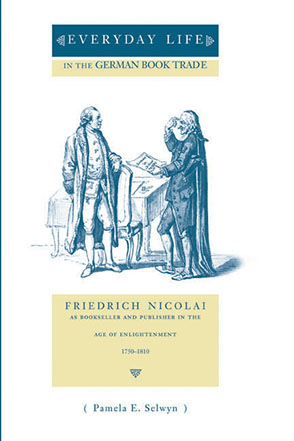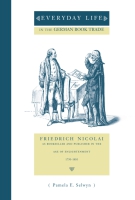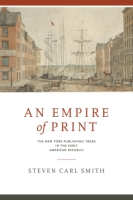
Everyday Life in the German Book Trade
Friedrich Nicolai as Bookseller and Publisher in the Age of Enlightenment
Pamela E. Selwyn
Everyday Life in the German Book Trade
Friedrich Nicolai as Bookseller and Publisher in the Age of Enlightenment
Pamela E. Selwyn
“Selwyn’s work makes a remarkable contribution to our understanding of the book trade and publishing world during the Aufklärung in Prussia. Apart from what we learn about the specific career of Nicolai, we gain many insights into how books came into existence, what tactics prospective authors used, the joys and sorrows of the publishers and booksellers, how various governments attempted to monitor the book trade, the nature of book piracy, and a host of other matters. Selwyn’s excellent skills as a writer allow her to describe these issues in an engaging way . . . It is a marvelous piece of work—a delight to read.”
- Description
- Reviews
- Bio
- Subjects
While long neglected by students of the period, who tended to accept the caricature of him as a philistine who failed to recognize Goethe’s genius, Nicolai has experienced a resurgence of interest among scholars reexploring the German Enlightenment and the literary marketplace of the eighteenth century.
This book, drawing upon Nicolai’s large unpublished correspondence, rounds out the picture we have of Nicolai already as author and critic by focusing on his roles as bookseller and publisher and as an Aufkärer in the book trade.
“Selwyn’s work makes a remarkable contribution to our understanding of the book trade and publishing world during the Aufklärung in Prussia. Apart from what we learn about the specific career of Nicolai, we gain many insights into how books came into existence, what tactics prospective authors used, the joys and sorrows of the publishers and booksellers, how various governments attempted to monitor the book trade, the nature of book piracy, and a host of other matters. Selwyn’s excellent skills as a writer allow her to describe these issues in an engaging way . . . It is a marvelous piece of work—a delight to read.”
“Thanks to remarkably thorough documentation, Selwyn can offer an extraordinarily detailed exploration of the entire scope of Nicolai’s practice—his contacts with authors, the production process itself, his distribution and sales system. The resulting work depicts the behind-the-scenes process that explains the triumphs of many of Germany’s greatest classical writers.”
“Friedrich Nicolai—bookseller, publisher, author, and Aufklärer—would have approved of this book. Like many of the volumes he published and sold in a career spanning the rise of a self-conscious modern German public, it enlightens and informs, eschewing the latest philosophical and literary fancies for sober, solid, and comprehensive analysis. Pamela E. Selwyn has digested an enormous amount of archival material, including a significant proportion of letters in the Nicolai Nachlass, to provide an in-depth look at the German book trade in the second half of the eighteenth century, seen through the prism of one of the most protean figures of the era.”
“This is a well-researched, well-written contribution to the literature on Friedrich Nicolai.”
“Everyday Life in the German Book Trade is welcome as the first detailed account by a book historian of Nicolai as a publisher. It ‘aims to present a rounded picture of Nicolai’s life as a bookseller and publisher’ — and succeeds admirably.”
“[Selwyn’s] splendid book does full justice to this central Enlightenment figure while at the same time giving a thorough and engaging picture of the ins and outs of the German book trade in the second half of the eighteenth century.”
“None of it lends itself to easy summary, but time and again the reader is provided with skillful vignettes which give a lively picture of the work and working conditions of an exceptional eighteenth-century German publisher.”
“Moreover, Selwyn has returned to the archives, so that her study is a significant new contribution, not just a reworking of published material.”
“Selwyn therefore is very successful in giving a vivid picture of the everyday life of the publisher and bookseller Nicolai, the first extensive treatment of this most important Enlightenment figure in the English language. Not the least of its merits is the full use of the archival material on which it is based.”
“[H]er splendid book does full justice to this central Enlightenment figure while at the same time giving a thorough and engaging picture of the ins and outs of the German book trade in the second half of the eighteenth century.”
“Brimming with facts, Selwyn’s study is a substantial contribution to the history of books and literature. It is also an entertaining and well-written book.”
“But she has certainly done her job well in a first book that is both well-written and well-grounded in manuscript collections drawn from all over German-speaking Europe.”
“Occasional repetitions in the presentation do not detract from the outstanding quality of Selwyn’s study.”
Pamela E. Selwyn is a freelance translator whose work has appeared in various publications.
Also of Interest
Mailing List
Subscribe to our mailing list and be notified about new titles, journals and catalogs.




